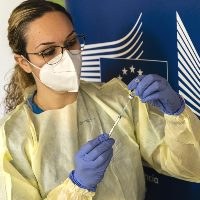(BRUSSELS) – The EU Commission granted conditional marketing authorisation for the COVID-19 vaccine developed by US firm Moderna Wednesday, making it the second COVID-19 vaccine authorised in the Union.
This authorisation follows a positive scientific recommendation based on a thorough assessment of the safety, effectiveness and quality of the vaccine by the European Medicines Agency (EMA) and is endorsed by the Member States.
“Today we are authorising a second safe and effective vaccine from Moderna, which together with BioNTech-Pfizer, will ensure that 460 million doses will be rolled out with increasing speed in the EU, and more will come,” said the Health Commissioner Stella Kyriakides.
Moderna submitted on 30 November 2020 an application for marketing authorisation to EMA, which had already started a rolling review of the data in November. Thanks to this rolling review, EMA has been assessing the quality, safety and efficacy of the vaccine as data has become available. EMA’s human medicines committee (CHMP) has thoroughly assessed the data and recommended by consensus that a formal conditional marketing authorisation is granted. A conditional marketing authorisation is one of EU’s regulatory mechanisms for facilitating early access to medicines that fulfil an unmet medical need, including in emergency situations such as the current pandemic.
On the basis of EMA’s positive opinion, the Commission has verified all the elements supporting the marketing authorisation and consulted Member States before granting the conditional market authorisation.
The Moderna vaccine is based on messenger RNA (mRNA). mRNA plays a fundamental role in biology, transferring instructions from DNA to the cells’ protein making machinery. In an mRNA vaccine, these instructions produce harmless fragments of the virus, which the human body uses to build an immune response to prevent or fight disease.
When a person is given the vaccine, their cells will read the genetic instructions and produce a spike protein, a protein on the outer surface of the virus which it uses to enter the body’s cells and cause disease. The person’s immune system will then treat this protein as foreign and produce natural defences antibodies and T cells against it.
Questions and Answers: Conditional marketing authorisation of COVID-19 vaccines



